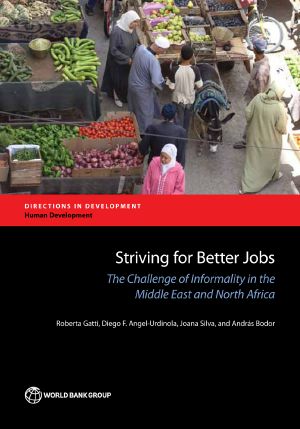Striving for Better Jobs

- Authors
- Gatti, Roberta & Angel-Urdinola, Diego F. & Silva, Joana
- Publisher
- World Bank Publications
- ISBN
- 9780821395356
- Date
- 2012-06-28T00:00:00+00:00
- Size
- 13.41 MB
- Lang
- en
While economic growth has been sustained for a number of years in many countries in the Middle East and North Africa (MENA) region, this has not resulted in the creation of an adequate number of jobs and has succeeded, at best, in generating low-quality, informal jobs. While there is a great deal of heterogeneity across countries, informality in MENA is widespread, and some countries in the region are amongst the most informal economies in the world. The book looks at informality through a human development angle and focuses specifically on informal employment. In line with this approach, the working definition for informality adopted in the book is "lack of social security coverage" (usually understood as pensions, or if a pension system does not exist, as health insurance), which captures well the vulnerability associated with informal employment. Informal workers in MENA are generally engaged in low productivity jobs - more so than in comparator countries -, are paid less for otherwise similar work in the formal sector, and self-report low levels of satisfaction at work. Also, informal workers in MENA face important mobility barriers into formal employment and thus lack of social security coverage against health, unemployment, and old-age risks. Formal employment in the MENA region is strongly associated with public sector employment. Opportunities for formal employment in the private sector in the region remain very limited. The book identifies 5 strategic directions to promote long-term inclusive growth and formality, namely: (i) fostering competition; (ii) realigning incentives in the public sector; (iii) moving towards labor regulations that promote labor mobility and provide support to workers in periods of transition; (iv) enhancing the productivity of informal workers through training and skills upgrading; and (v) reforming existing social insurance systems and introduce new instruments for coverage extension. This book is addressed to policy makers, academics, and practitioners who wish to understand the phenomenon of informal employment, and policy options for promoting more inclusive and productive labor market opportunities.